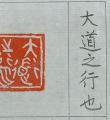Classic of Rites
《礼记·礼运·大道之行也》
 大道之行也,天下为公。选贤与能,讲信修睦,故人不独亲其亲,不独子其子,使老有所终,壮有所用,幼有所长,矜寡孤独废疾者,皆有所养。男有分,女有归。货,恶其弃于地也,不必藏于己;力,恶其不出于身也,不必为己。是故,谋闭而不兴,盗窃乱贼而不作,故外户而不闭,是谓大同。
大道之行也,天下为公。选贤与能,讲信修睦,故人不独亲其亲,不独子其子,使老有所终,壮有所用,幼有所长,矜寡孤独废疾者,皆有所养。男有分,女有归。货,恶其弃于地也,不必藏于己;力,恶其不出于身也,不必为己。是故,谋闭而不兴,盗窃乱贼而不作,故外户而不闭,是谓大同。
The ultimate universal principle revolves around the truth that all men under heaven are created equal.
Talents, virtue, and ability are the only base for assignments.
Dignity, trust, and mutual respect are the core components of enlightenment.
Man loves not only his related ones, nurtures not only his own sons.
Competent provisions are secured for the aged, work opportunities are offered to the able-bodied, and means of growing are available to the young.
No one’s rights are to be denied. All receive the same kindness and compassion, even the widows and widowers, orphans and childless, disabled and ailing.
Male is with responsibility, female is with security.
Possession of unneeded is abandoned, instead of kept for one’s own gratification.
Force of excess is eliminated, instead of exerted to one’s own advantage.
Doing so, to plot is repressed, to plunder is not desired.
Hence, the outer border remains open, and there is no need to be fended.
This is what we call a state of Grand Equality.
- translated by Jonathan Chen
Regarding the line “Possession of unneeded is abandoned, instead of kept for one’s own gratification”, I find it is amazingly intriguing with the following quote by Natalie Clifford Barney:
“Why grab possessions like thieves, or divide them like socialists when you can ignore them like wise men?”


Follow me
Follow me in these Social Networks